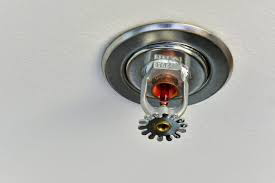Corrosion is one of the most common causes of malfunctioning fire sprinklers and often causes a failing fire sprinkler inspection . When there is Oxygen present in the pipes running along the building for the fire sprinkler system, it can have chemical reactions with water and the metal that makes up the piping, and when it solidifies it can corrode.
Corrosion in Fire Sprinkler Systems
Oxygen can dissolve naturally into water. In a normal 1000 gallon fire sprinkler system, any and all oxygen that’s confined inside the pipes of the system will be absorbed. Shockingly it only takes up to 30 days for the dissolved oxygen to produce 34 pounds of solid materials. In any wet fire sprinkler system, the solids can sink down into low spots and begin to cause corrosion. If there is ever fresh oxygen that is then introduced into the system, the corrosion process can begin again, adding more and more solids into the fire sprinkler system. Dry fire sprinkler systems and pre-action systems are not immune to the problems caused by corrosion as well. Corrosion is actually more common in dry sprinkler systems due to the oxygen rates being substantially higher. Moisture gets into the dry systems from testing and or condensation and then interacts with the iron inside the piping causing corrosion.
Agents that Catalyst Corrosion
These are the five primary causes that can speed up the corrosion process:
• When there oxygen is introduced into the sprinkler piping, the oxygen dissolves into the water, and it causes instant metal loss.
• Solids that are created from reactions that have been listed above, cause corrosion to become more aggressive.
• When piping is removed, it allows a new location for oxygen to attack.
• When a wet systems are drained and then refilled with water, inevitably a fresh source of oxygen is then introduced in the system.
• When temperatures change and air falls below the dew point, water condenses into small drops, speeding up corrosion.
Solids and Bacteria
Bacteria exists in water naturally, which is something that can’t be changed. This leads many people to believe that bacteria is the responsible party for corrosion. While it does happen the bacteria is almost always the secondary cause for corrosion.
Oxygen is almost always the primary cause of corrosion in a fire sprinkler system.
Want to learn more about corrosion in fire sprinkler systems in Phoenix? You can learn more and find proactive ways to handle corrosion by contacting Titan Alarm today.
Give us a call at 602-680-4567.

